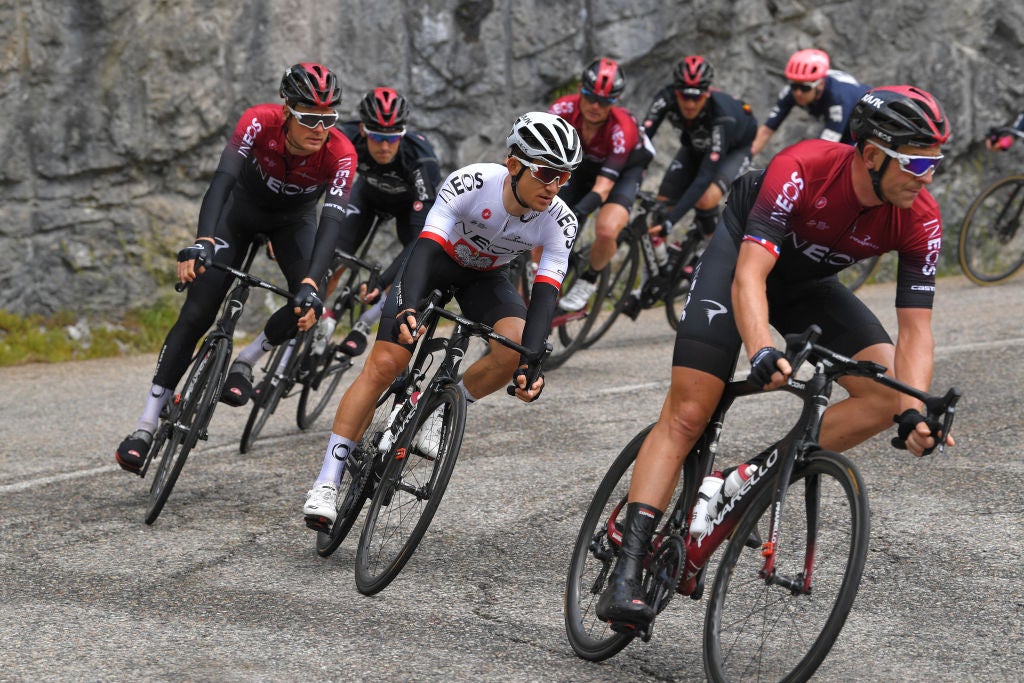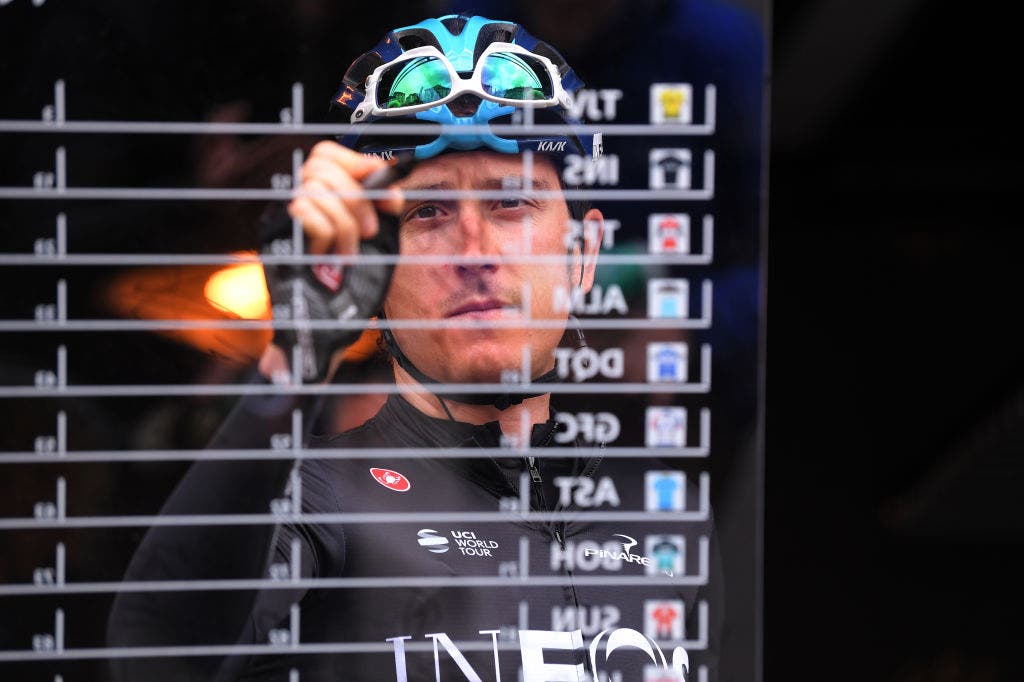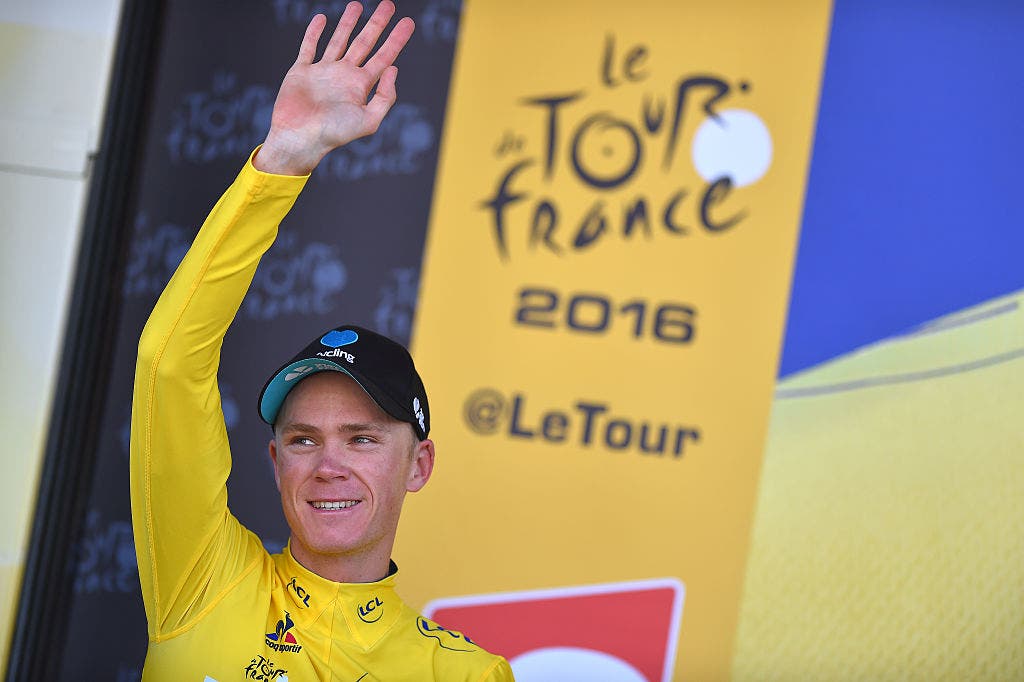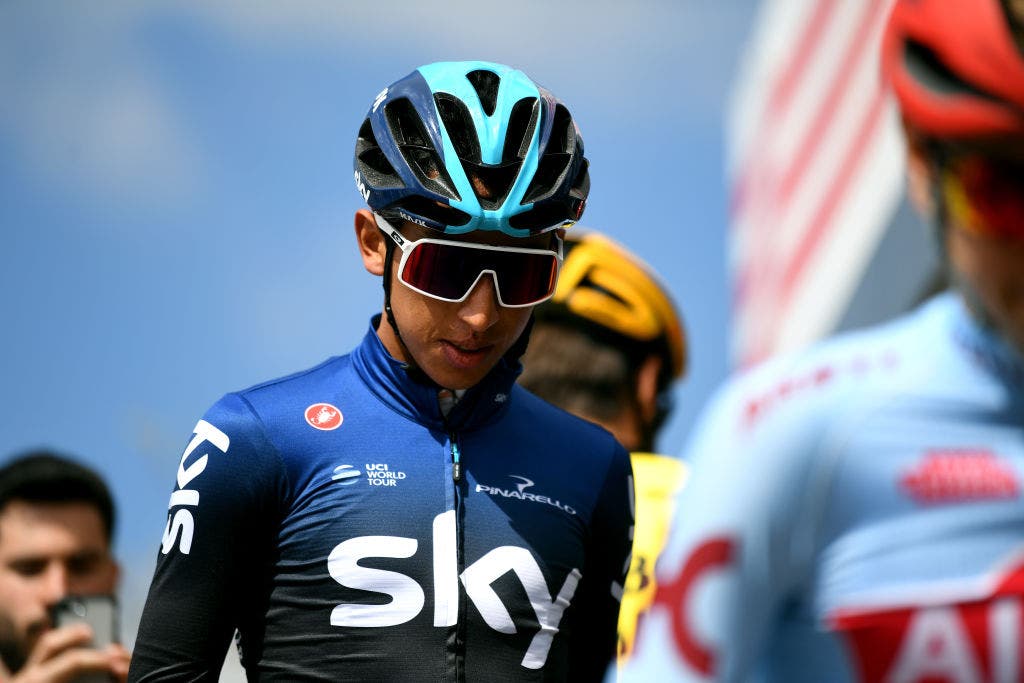Roundtable: How does Froome's injury change Ineos's Tour de France plans?

SAINT-MICHEL-DE-MAURIENNE, FRANCE - JUNE 14: Michal Kwiatkowski of Poland and Team INEOS / Dylan van Baarle of The Netherlands and Team INEOS / during the 71st Criterium du Dauphine 2019, Stage 6 a 229km stage from Saint-Vulbas Plaine de l'Ain to Saint-Michel-de-Maurienne / #Dauphine / @dauphine / on June 14, 2019 in Saint-Michel-de-Maurienne, France. (Photo by Tim de Waele/Getty Images)
The cycling world is still reacting to Chris Froome’s scary crash on Wednesday, which knocked him out of the Tour de France. All of us here at VeloNews wish Froome a speedy recovery from his many injuries.
And, as always, the sport continues with its races, storylines, and speculation. Froome’s was the heavy favorite to win this year’s Tour, and his absence shifts the dynamics for both the race, Team Ineos, and the other contenders. How does a Froome-less Tour change things? And how does this crash impact Froome’s place in history?
Let’s roundtable.

How does Froome’s absence change Team Ineos’s Tour de France strategy?
Andrew Hood @eurohoody: It shouldn’t change much at all. In fact, without Froome, Ineos will be able to bring yet another support rider for Geraint Thomas and Egan Bernal, perhaps giving them even more firepower leading into the mountains. Ineos will still ride to control the race, and hope that Thomas and Bernal have the legs to finish it off. Cycling’s richest team has the depth to still race to win the Tour de France despite losing a rider as strong as Chris Froome.
Hugo Gladstone @hugogladstone: I agree that their tactics may look unchanged, but I think it will will enormously change their mindset, as well as that of their rivals. Froome is a multiple grand tour winner. He’s backed up results time and again, and through times of adversity. Like Wiggins in 2012, Thomas won last year’s race because everything fell into place for him. There’s plenty of reason for them to believe in Thomas and Bernal to continue the team’s run of success, but their confidence will not be nearly as solid as it would be with Froome on board.
Fred Dreier @freddreier: From a pure leadership perspective, Geraint Thomas’s role becomes more clear as the primary leader, and Egan Bernal upgrades from a secret weapon into a second leader. From the perspective of which stages they target—I don’t think anything changes. I do think that Ineos loses its air of untouchability with Froome out. Froome’s mere presence on the roster undoubtedly brings a high level of confidence to the entire organization, due to his success in all manners of situations. And the team is no longer racing with the history books on the line, which could eliminate some pressure.

How could the crash impact Froome’s place within cycling history?
Andy: Not at all. Six grand tour victories — maybe seven, depending on what happens with the 2011 Vuelta — already puts Froome in esteemed company even if he cannot recover from these injuries. If anything, a comeback and another Tour victory would only serve to bolster his reputation as one of the great grand tour riders.
Hugo: I think it could bring a few of his detractors to his side. Those who are suspicious of his ability will likely remain so. But those who have just not warmed to his character might just realize what a presence he had at the Tour. Or plain and simply have some sympathy for him. As for Hoody’s suggestion of an incredible comeback, we’re suckers for those every time.
Fred: The window for Froome to win another Tour de France is closing—he will be 35 next year. Should Froome never take another Tour title, then I think this crash has a big impact on his overall legacy. Historians will view him as one of the all-time greats, albeit with a somewhat tragic conclusion. Retelling Froome’s story of grand tour dominance could end with the sad final chapter of the catastrophic crash that kept him from joining the pantheon of five-time champions. When combined with the fact that Froome was likely the strongest rider at the 2012 Tour—a race where he worked for Bradley Wiggins—the crash will simply add questions to Froome’s place in Tour history. Could Froome have been the Tour’s first six-time winner? Perhaps the crash will go down in history alongside the fan who punched Eddy Merckx during the 1975 Tour de France.

What is your biggest question surrounding the news that Juan Jose Cobo may lose his 2011 Vuelta due to a biological passport violation?
Andy: A lack of transparency and clear information is always a point of frustration when it comes to cases like these, but it’s natural that anti-doping authorities keep their cards close to their chest for both legal and tactical reasons. Biological passport cases are tricky and it appears, at least based on media reports in Spain, they’ve been on Cobo’s case for several years. A broader explanation of why the case took so long will be forthcoming, probably within 30 days once the WADA appeal window is closed.
Hugo: There was a lot of suspicion around Cobo in 2011. But if they didn’t have the methodology or intelligence to prove anything, then what could they do. There is always more resource that can be chucked at anti-doping efforts, but budgets aren’t unlimited. The small thing I’m most curious about, then, is the timing of the announcement. Genuine coincidence, or did someone have an idea that rushing it out could be a feel good twist on the current news surrounding Froome? Either way, it’s no big deal.
Fred: I’m with Hugo. Why did this news break the day after Froome’s crash, when the entire sport was hyper-focused on the ramifications that the injury would have on the sport? It’s as if the PR officials saw an ultra-crowded news cycle and decided to slip this story in, hoping it would get buried. When we compare this to last summer’s bizarre announcements surrounding Froome’s salbutamol adverse analytical on the eve of the Tour, it is another example of the sport’s strange way of dealing with news.

Which rider benefits the most from Froome’s absence at the Tour?
Andy: Egan Bernal. Without Froome, the Colombian sensation will have even more room to move. Geraint Thomas starts as Ineos’s top leader, but Bernal will be waiting in the wings to jump if Thomas shows signs of weakness. No team in the peloton has the experience racing and managing the Tour as Ineos. It’s Bernal who could most profit from Froome’s absence.
Hugo: No one in their right mind would wish those injuries on anyone, let alone somebody they call a mate. But it would only be natural for Geraint Thomas to benefit in Froome’s absence from this year’s Tour. Last year he benefitted from his presence. But he also admits there were points when he wasn’t convinced by their alliance. They did very well to ultimately stay united. But could that have lasted another Tour? Would there not be moments when they’d (secretly) look to get one up on the other? Froome no longer poses that niggling doubt for Thomas. Bernal, on the other hand, is another story.
Fred: If Tom Dumoulin can find his health before the Tour, then I believe Froome’s absence opens the door for him to mount a credible push for the victory. Ineos is undoubtedly strong, however losing Froome does take away a very physical and psychological advantage. Dumoulin battled Froome and Thomas last year en route to his second-place finish. It seems only natural that Froom’s absence would benefit him.